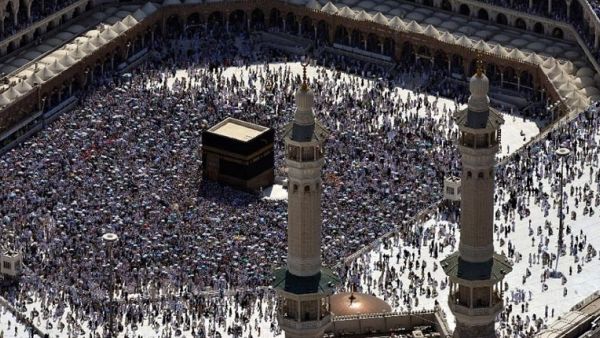A court in Saudi Arabia has suspended a seven-year jail sentence, a SR 30,000 fine and 2,100 lashes for a blasphemous Indian national after the judge was informed that he had converted to Islam and therefore came under a provision that exempted him from the punishment.
The expatriate was last year jailed after he had been found guilty by a court of law of posting a picture showing the Grand Mosque in Makkah as a Hindu temple.
The picture, displayed on Facebook, showed Al Masjid Al Haram, but instead of the Kaaba, the cuboid building at the centre of Islam's most sacred mosque, there were Hindu symbols.
Muslims all over the world are expected to face in the direction of the Kaaba when performing their daily prayers.
A Saudi company, shocked by the picture, alerted the Commission for the Promotion of Virtue and the Prevention of Vice, the religious police, and an investigation was launched.
The suspect, arrested by the police at the airport, admitted the social network page was his, but said that he had seen a link to the picture on another account and that he had to click "Like" to enable him to see it. The picture was automatically loaded onto his account for his followers to see, he added.
However, the investigators decided that he was guilty of breaking the anti-cybercrime law by promoting an offensive picture.
Under the law, anyone who is involved in the production, preparation, transmission, or storage of material impinging on public order, religious values, public morals, and privacy, through the information network or computers, can be jailed up to five years and made to pay a fine of up to 3 million riyals (Dh2.94 million.)
The court overseeing his trial sentenced him to seven years in jail, imposed a SR30,000 fine and ordered he receive 2,100 lashes.
However, the defendant later said he had converted to Islam and the Court of Appeals this week suspended the sentences despite the opposition of the public prosecutor, Saudi daily Okaz reported on Wednesday.
The Appeals Court said that its decision to release the prisoner was based on the text of the Chapter of Al Maida (The Table Spread) in the Holy Quran that says that there will be no punishment for those who repent.
"Except those who repent before you have power over them for you should know that Allah is Forgiving and Compassionate." (Al Maida -34)
The judge said that he also relied on the saying of Prophet Mohammad (PBUH) that highlights that [converting to] Islam erases prior sins and guilty acts.
By Habib Toumi








